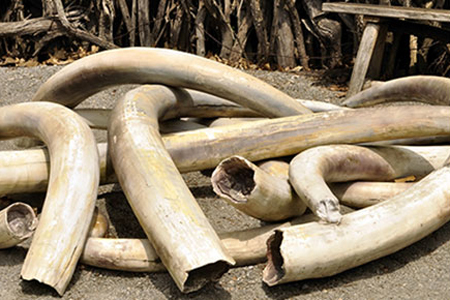
Peter Li is a professor at the University of Houston-Downtown and a China policy specialist for Humane Society International (HSI). Iris Ho is a program manager for the Wildlife Department at HSI. This Op-Ed is adapted from an article that first appeared in the Global Times. Li and Ho contributed this article to LiveScience's Expert Voices: Op-Ed & Insights.
Historically and globally, demand for expensive wildlife products often follows economic prosperity. Thus, not surprisingly, China's rise as an economic superpower has brought with it new "status vices." Some people with income to spare spend it on lavish and often outlandish wildlife luxury goods like rhino horn and elephant ivory. While economic prosperity is good for a nation and its people, it may spell doom for wildlife species.
China is not immune to this problem and is not alone. The United States and other countries went through similar episodes during their economic development. But the Chinese government has shown the world that it is willing to combat the illicit wildlife trade.
The recent seizure of 645 illegally obtained and trafficked wolf pelts from Greece at Beijing's Capital International Airport, for example, was a commendable act by China's General Administration of Customs. Together with other recent seizures of elephant tusks and rhino horns in Hong Kong, the Chinese government has taken a stand in opposition to the practice of illegal commerce in wildlife.
In recent years, China has faced the daunting task of stopping the influx of wildlife contraband and protecting the threatened species within its national borders. Chinese authorities have confronted a challenging situation that has invited misunderstanding and, oftentimes, accusations — this is because China still allows legal ivory sales. China and the Chinese living and working in Africa will continue to be under scrutiny and be questioned about how ivory from Africa ends up in China. Nevertheless,China is standing firm. The recent actions are particularly laudable because China occupies a pivotal strategic position in the global fight for wildlife protection.
With the global economic balance of power shifting eastward, the rising purchasing power in East Asia has made it a new destination for illegal ivory and other wildlife products. China is also rich in biodiversity, and is a top market for wildlife and its parts. Effective enforcement of China's Law on the Protection of Wildlife and the nation's honoring its obligations under the Convention on International Trade in Endangered Species serve to protect Chinese indigenous species and those in other countries.
Governments in the rapidly modernizing East Asia region are also engaged in finding a way to balance preservation of cultural traditions with the safeguarding of Earth's rarest creatures for future generations. For example, ivory carving is a time-honored skill in East Asia and Southeast Asia. Today, all ivory carving facilities in China must be approved by the government. A long-running debate on the Chinese Internet has explored whether elements of cultural tradition must evolve with the new challenges faced in the contemporary era.
Get the world’s most fascinating discoveries delivered straight to your inbox.
There are voices for passing ivory-carving skills to a younger generation. However, it is a shortsighted choice to allow questionable traditional practices to continue if it causes negative impacts on the long-term sustainability of the global ecosystem. China's implementation of an ivory-product identification system represents a political determination to discourage the expansion of the ivory-carving business, a wise policy decision.
Additionally, as the single biggest investor in Africa, China bears special responsibility to that continent's people and wildlife. Through education and enforcement, China and other East Asian nationsneed to address the demand for ivory, rhino horn and other animal products. An individual moonlighting as an ivory trader, out of ignorance or deliberately, violates international laws, and the impacts are costly and hugely irresponsible. Ivory traders can also damage the reputations of members of the law-abiding Chinese business community working hard to expand rightful operations in Africa. Furthermore, reports of the involvement of organized militia and terrorist groups in elephant poaching are highly troubling and could fuel instability and undermine African regional security. This concerns the national interest of many countries including China.
A series of Chinese government initiatives, international partnerships, strengthened customs enforcement, and increased Chinese public concern provide strong evidence of change in the country. As a vital force in the global alliance for wildlife protection, China's growing commitment and efforts to combat illicit trafficking can save elephants and rhinos from extinction, while inviting global commendation for its efforts.
This article is adapted from Battle to Protect World's Wildlife Depends on Beijing's Commitment, which first appeared in the Global Times. The views expressed are those of the author and do not necessarily reflect the views of the publisher. This version of the article was originally published on LiveScience.
 Live Science Plus
Live Science Plus






